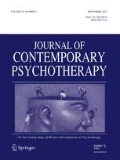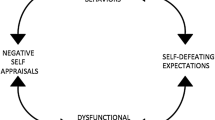Abstract
The basic principles of an emotion-focused approach to therapy (EFT) are presented. In this view, emotion is seen as foundational in the construction of the self and is a key determinant of self-organization. As well as simply having emotion, people also live in a constant process of making sense of their emotions. Personal meaning emerges by the self-organization and explication of one’s own emotional experience, and optimal adaptation involves an integration of reason and emotion. In EFT, distinctions between different types of emotion (i.e., primary versus secondary, adaptive versus maladaptive) provide therapists with a map for differential intervention. Therapists are viewed as emotion coaches who help people become aware of, accept, and make sense of their emotional experience. Four major empirically supported principles of emotion awareness, emotion regulation, emotion transformation and reflection on emotion guide emotion coaching and serve as the goals of treatment. A case example illustrates how the principles of EFT helped a young woman to overcome her core maladaptive fears and mobilize her ability to protect herself.
Similar content being viewed by others
References
Arnold, M. B. (1960). Emotion and personality. NewYork, NY: Columbia University Press.
Bohart, A., & Greenberg, L. (Eds.) (1997). Empathy reconsidered: New directions in theory research and practice. Washington, DC: American Psychological Association.
Darwin, C. (1897). The expression of emotions in man and animals. New York Philosophical Library (Original work published 1872).
Davidson, R. (2000). Affective style, mood and anxiety disorders: An affective neuroscience approach. In R. Davidson (Ed.), Anxiety, depression and emotion (pp. 88–108). Oxford: Oxford University Press.
Foa, E. B., & Kozak, M. J. (1986). Emotional processing of fear: Exposure to corrective information. Psychological Bulletin, 99(1), 20–35.
Fosha, D. (2000). The transforming power of affect: A model of accelerated change. New York, NY: Basic Books.
Frederickson, B. (2001). The role of positive emotions in positive psychology: The broaden-and-build theory of positive emotions. American Psychologist, 56(3), 218–226.
Frijda, N. H. (1986). The emotions. Cambridge: Cambridge University Press.
Gendlin, E. T. (1996). Focusing-oriented psychotherapy: A manual of the experiential method. New York: Guilford Press.
Greenberg, L. (2002). Emotion-focused therapy: Coaching clients to work through feelings. Washington, DC: American Psychological Association.
Greenberg, L., & Johnson, S. (1988). Emotionally focused couples therapy. New York, NY: Guilford Press.
Greenberg, L. S., & Paivio, S. C. (1997). Working with the emotions in psychotherapy. New York, NY: Guilford Press.
Greenberg, L. S., & Pascual-Leone, J. (1995). A dialectical constructivist approach to experiential change. In R. A. Neimeyer & M. J. Mahoney (Eds.), Constructivism in psychotherapy (pp. 169–191). Washington, DC: American Psychological Association.
Greenberg, L., & Pascual-Leone, J. (2001). A dialectical constructivist view of the creation of personal meaning. Journal of Constructivist Psychology, 14(3), 165–186.
Greenberg, L. S., Rice, L. N., & Elliot, R. (1993). Facilitating emotional change: The moment by moment process. New York, NY: Guilford Press.
Greenberg, L. S., & Safran, J. D. (1989). Emotion in psychotherapy. American Psychologist, 44, 19–29.
Greenberg, L., & Watson, J. (2006) Emotion-focused therapy of depression. Washington, DC: American Psychological Association.
Guidano, V. F. (1991). The self in process. New York, NY: Guilford Press.
Johnson, S., & Greenberg, L. (1985). Differential effects of experiential and problem solving interventions in resolving marital conflict. Journal of Consulting and Clinical Psychology, 53, 175–184.
Linehan, M. M. (1993). Cognitive-behavioral treatment of borderline personality disorder. New York: The Guilford Press.
Mahoney, M. (1991). Human change processes. New York, NY: Basic Books.
Neimeyer, R., & Mahoney, M. (1995). Constructivism in psychotherapy. Washington, DC: American Psychological Association.
Oatley, K., & Jenkins, J. (1992). Human emotions: Function and dysfunction. Annual Review of Psychology, 43, 55–85.
Oatley, K. (1992). Best laid schemes. Cambridge: Cambridge University Press.
Pascual-Leone, J. (1991). Emotions, development and psychotherapy: A dialectical constructivist perspective. In J. Safran & L. Greenberg (Eds.), Emotion, psychotherapy and change (pp. 302–335). New York, NY: Guilford Press.
Pennebaker, J. W. (1990). Opening up: The healing power of confiding in others. New York, NY: William Morrow.
Pennebaker, J. W. (1997). Writing about emotional experiences as a therapeutic process. Psychological Science, 8, 162–166.
Spinoza, B. (1967). Ethics (Part IV). New York: Hafner Publishing Company.
Sroufe, L. A. (1996). Emotional development: The organization of emotional life in the early years. New York: Cambridge University Press.
Schore, A. N. (2003). Affect dysregulation and disorders of the self. New York, NY: W.W. Norton & Co.
Stern, D. (1985). The interpersonal world of the infant. New York, NY: Basic Books.
Van der Kolk, B. A. (1995). The body keeps the score: Memory and the evolving psychobiology of posttraumatic stress. Harvard Review of Psychiatry, 1, 253–265.
Author information
Authors and Affiliations
Corresponding author
Rights and permissions
About this article
Cite this article
Greenberg, L. Emotion-Focused Therapy: A Synopsis. J Contemp Psychother 36, 87–93 (2006). https://doi.org/10.1007/s10879-006-9011-3
Published:
Issue Date:
DOI: https://doi.org/10.1007/s10879-006-9011-3




